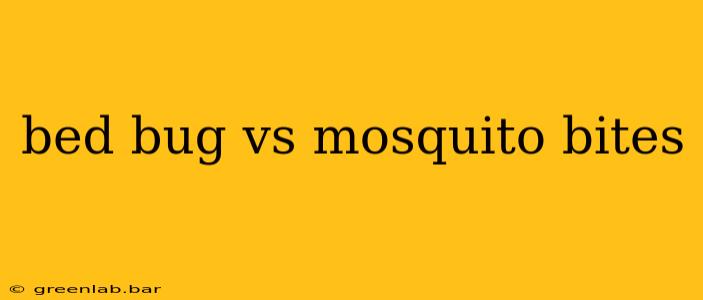Are those itchy welts on your skin bed bugs or mosquitoes? Distinguishing between these two common biting insects is crucial for effective treatment and preventing future infestations. This comprehensive guide will help you identify the culprits and learn how to deal with the aftermath.
Key Differences: Bed Bugs vs. Mosquitoes
While both bed bugs and mosquitoes leave itchy bites, there are several key differences that can help you determine the source of your discomfort.
Bite Appearance
-
Bed Bugs: Bed bug bites often appear in clusters or lines, sometimes resembling a rash. They're typically small, red welts that can become inflamed and itchy. They don't usually have a central puncture wound like mosquito bites. The bites themselves may not be immediately noticeable, sometimes appearing hours or even days after the feeding.
-
Mosquitoes: Mosquito bites are typically single, red bumps with a noticeable central puncture mark where the mosquito’s proboscis pierced the skin. They can also be swollen and itchy. Often, a single mosquito will leave several bites within a short distance.
Location of Bites
-
Bed Bugs: Bed bugs primarily bite exposed skin while you're sleeping. You'll often find bites on your arms, legs, neck, and shoulders. They tend to avoid hairy areas.
-
Mosquitoes: Mosquitoes can bite anywhere on exposed skin, regardless of whether you're sleeping or awake. They are active during the day and night, depending on the species.
Other Symptoms
-
Bed Bugs: Besides itchy welts, some people may experience a more severe allergic reaction with larger welts, blisters, or even a mild fever. The intense itching can disrupt sleep.
-
Mosquitoes: Besides itching, mosquito bites can sometimes cause swelling, redness, and localized pain. In rare cases, they can transmit diseases like West Nile virus, Zika virus, or malaria.
Finding the Insects
-
Bed Bugs: Inspect your bedding, mattress seams, box springs, and furniture for small, brown insects. You might also find tiny dark spots (bed bug feces) or shed skin.
-
Mosquitoes: Mosquitoes are usually found near standing water, vegetation, or damp areas. You may see them flying around your home, especially at dawn and dusk.
Treatment for Bites
For both bed bug and mosquito bites, the primary treatment focuses on relieving itching and preventing infection.
-
Over-the-counter remedies: Hydrocortisone cream, calamine lotion, or antihistamine creams can help reduce itching and inflammation. Oral antihistamines can also provide relief from itching and allergic reactions.
-
Home remedies: Applying a cold compress, baking soda paste, or aloe vera gel can soothe the bites. Avoid scratching, as this can increase the risk of infection.
-
Severe reactions: If you experience a severe allergic reaction (e.g., difficulty breathing, widespread rash, swelling), seek immediate medical attention.
Prevention
Preventing both bed bug and mosquito bites requires different strategies.
-
Bed Bugs: Maintaining a clean home, regularly inspecting your bedding, using mattress encasements, and professional pest control are effective ways to prevent bed bug infestations.
-
Mosquitoes: Eliminating standing water around your home, using mosquito repellent, wearing long sleeves and pants when outdoors, and installing screens on windows and doors can help prevent mosquito bites.
Conclusion
While both bed bugs and mosquitoes cause itchy bites, understanding their distinct characteristics is essential for proper identification and treatment. By carefully observing the appearance of the bites, their location, and other accompanying symptoms, you can effectively determine the source of your discomfort and take appropriate steps for relief and prevention. Remember to consult a medical professional if you experience severe reactions or suspect a disease transmission.

